On August 20th, Baidu announced its much-anticipated second quarter earnings report for 2019. During the quarter, Baidu achieved revenue of RMB 26.3 billion, a 9% increase from the previous quarter and a net profit of RMB 2.4 billion. Baidu’s performance has stabilized and exceeded market expectations.
After the release of the earnings report, Li Yanhong sent an internal letter to Baidu employees, reaffirming Baidu’s core strategy of “shaping the mobile foundation to win the AI era”. Among them, he specifically mentioned the role of Baidu smart applet, “smart applet helps us build a new content and service ecosystem.”
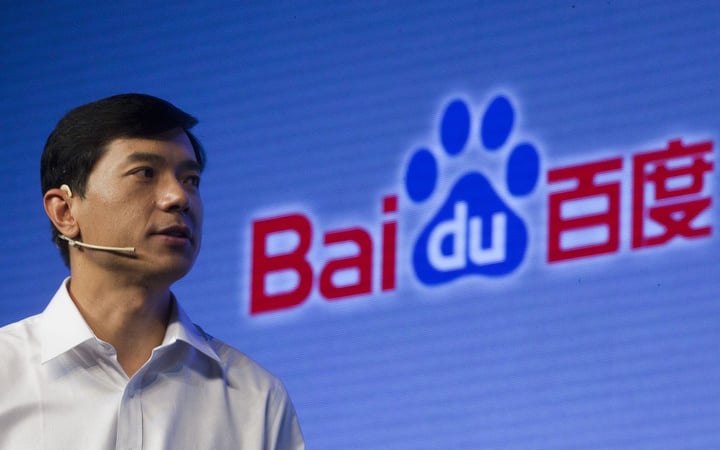
This is exactly the same as the 2019 Q2 earnings report released by Tencent a few days ago. Tencent also highlighted the development of the WeChat applet. “The number of small and medium-end applets has more than doubled year-on-year, and the categories of small programs have become more diversified.”
Tencent also specifically mentioned the development of content-based applets. In the past, because of the lack of centralized access and the interruption of chat information, content applets are generally considered to be difficult to succeed in WeChat applets, but the latest data shows that there are already more than a dozen content-small programs that live more than a month. million. WeChat is also increasing the retention and re-access of small programs by floating windows and testing one-time messages.
The prosperity of the small program ecology has led to the development of social e-commerce, social advertising and life services on the WeChat platform, the latest quarterly earnings report.Tencent’s game revenue has already accounted for about 30% of total revenue. Tencent is an important player in trying to diversify its income sources and embrace the industrial Internet.
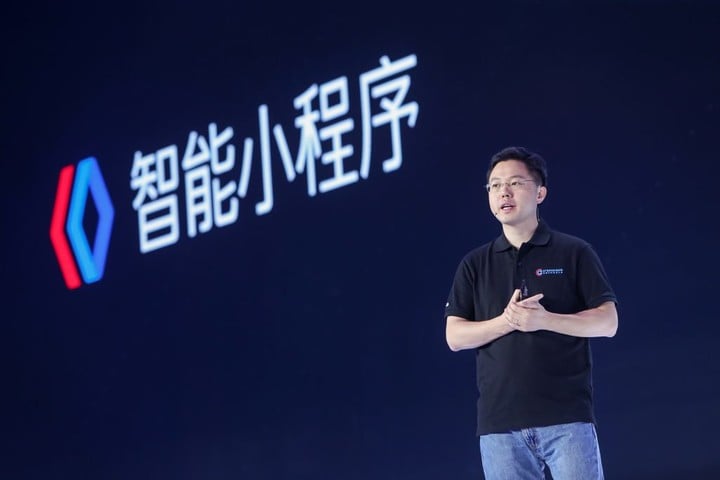
Baidu has the same considerations. After a brief period of transformation, Baidu’s overall performance has stabilized and rebounded. More importantly, the active users of Baidu App and smart applets have grown substantially. Baidu smart small program and Baijia number have become the two cores of Baidu’s mobile ecology. In addition to searching, Baidu enriches the content ecology, improves the ability to connect services and products, and creates a closed-loop, integrated service experience.
Since the launch of the small program on WeChat in early 2017, Alipay, Baidu, Today’s headlines, and several major mobile phone manufacturers have shown great interest in this kind of download-free, out-of-the-box service. After a brief wait and see, more and more developers have been involved in the small program ecology. In the mobile Internet world where the demographic dividend disappears and the Matthew effect is getting stronger, the small program is helping the super app to expand the platform boundary on the one hand, and helping developers get more traffic and user sources on the other hand. For users, the cost of finding content and getting services is also decreasing.
It can even be said that the mobile Internet is aging, and the small program Internet has just arrived.
Baidu Investment knows that hundreds of millions of questions and answers are connected to Baidu in the form of smart applets
On August 13th, the Q&A website announced that it had completed the $434 million F round of financing, and Baidu and Faster became new.Investors and Zhizhi quickly developed in-depth cooperation.
Baidu said that it will cooperate with the company to develop a deep strategic cooperation. It is known that the whole station will access the Baidu App in the form of a smart applet, and will add a product matrix such as Baidu search and information flow through algorithm distribution.

This is a win-win combination. Knowing that CEO Zhou Yuan said after the completion of the financing, knowing that like Baidu, they are facing the problem of information islands. In the era of mobile Internet, the tendency of each app to close content and services makes the cost of obtaining high-quality content higher and higher, and on the other hand, it is difficult for many medium and long tail applications to obtain exposure opportunities.
Under the new situation, opening up has become the common aspiration of many developers. Knowing that we want to complete the new vision of “knowledge universality”, Baidu wants to connect information and services, and the demands of both parties are the same.
At the same time, Baidu’s technology and platform features also determine that content-based services are well-suited for access. At the Baidu AI Developers Conference in July, the relevant person in charge of Baidu’s smart applet introduced a case: The Chicken Dictionary is a UGC’s aggregated network buzzword, a new culture of young people’s community, when users search for “small” in Baidu. In the chicken dictionary, the “chicken dictionary” smart applet will be first displayed in the search results; when the user views the home page stream in the Baidu App, the Baidu stream will be distributed from the smart applet according to the user’s attributes, interests and other personalized recommendations. Related content.
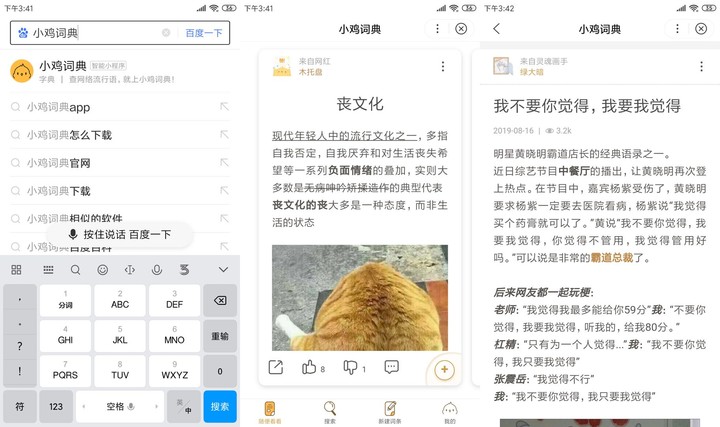
Baidu’s investment in knowing and deep cooperation with knowing, in addition to enriching its own content ecology, is also a benchmark for other content-based services. In addition to connecting people and information, Baidu also wants to connect high-quality information to bring greater value to users and premium content providers.
The latest news said that Baidu has completed its investment in the domestic well-known pan-tech interest community shell network, holding 9.38%. Although the in-depth cooperation between the two parties has not yet been finalized, it shows Baidu’s preference for high-quality hanging content and its determination to optimize its own content ecological construction.
From connecting “people and information” to connecting “people and services”
Under the new strategic layout, Baidu App not only meets the starting point of user needs, but also meets the end of user needs.
In early August, Baidu App general manager Ping Xiaoli explained the new strategic layout in an interview with the media. She said that at present, Baidu App has formed two search engines and two “traffic + information flow” and “100 companies”. No. + Smart Small Program” three-dimensional layout of the two ecological.

This also means that in addition to traditional connections and information, Baidu is trying to connect people and services through small programs.
The Baidu AI Developer Conference mentioned the case of the Shanghai Auto Show. In the past, the auto show was a very low-frequency demand for users. Search is the most important way to reach, but after searching for information, users still need to jump. Transferring a web page, app, or buying tickets through offline channels will result in a large loss.
In 2019, Shanghai Auto Show and Baidu jointly launched an official small program to provide a series of services such as online information inquiry, ticket purchase and exhibition area services. In the month before and after the entire auto show, the number of users served by the smart applet has accumulated to 3 million. In all third-party ticket sales channels, Baidu’s smart small program has the largest ticket sales volume, which is three times that of the second one. many.
This is a closed-loop experience from information inquiry to final order purchase. The Shanghai Auto Show applet explains the possibilities and advantages of Baidu’s connection service. Now Baidu is ready to use similar solutions for exhibitions and scenic spots. , Shangchao, museums and other scenes.
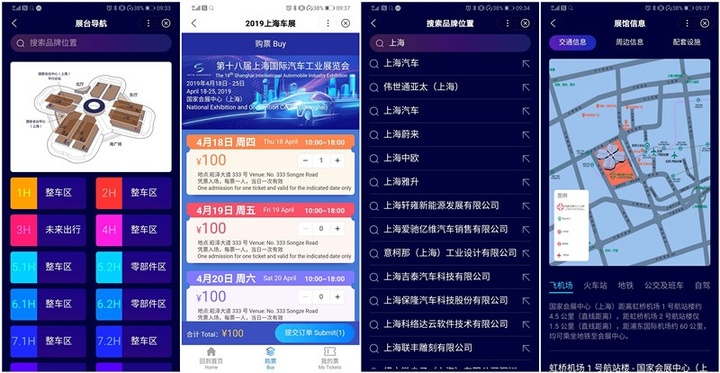
In the era of PC Internet, Baidu is the entrance to the website. All the webmasters are also particularly willing to be indexed by Baidu. They actually participate in the ecology of Baidu’s search engine and do a good job. But in the era of mobile Internet, this open connection was considered to be fragmented. Every app wants to get rid of the control of the search engine and upstream distribution, and lead the user to their own end.
Small programs have changed this situation, developers can display their content and services directly in search results, and download-free, WYSIWYG services also make search-to-conversion paths shorter. Moreover, not only low-frequency demand such as auto shows and museums, e-commerce shopping, life services, and government services can achieve closed-loop experience through search and small programs.
With small programs, Baidu solved the “zero-sum game” problem with developers, and developers have the will and possibility to return to Baidu.
Strategic investment is awesome to help businesses build a new official website with purchasing power
In early August, Baidu also announced an investment: $30 million in shares of SaaS service providers. After the investment is completed, there is a praise official said: You will become a strategic partner of Baidu’s smart small program. Baidu will provide comprehensive strategic support from the funds and resources. The two will jointly create a “transactional capability” for the brand. New official website.”
From helping the Taobao merchants to “WeChat” in WeChat marketing, to helping merchants to do “We have a compliment” in WeChat’s own mall, Zanzan has always been considered an important participant in WeChat’s ecology, even known as “WeChat Ecology”. The first share.”
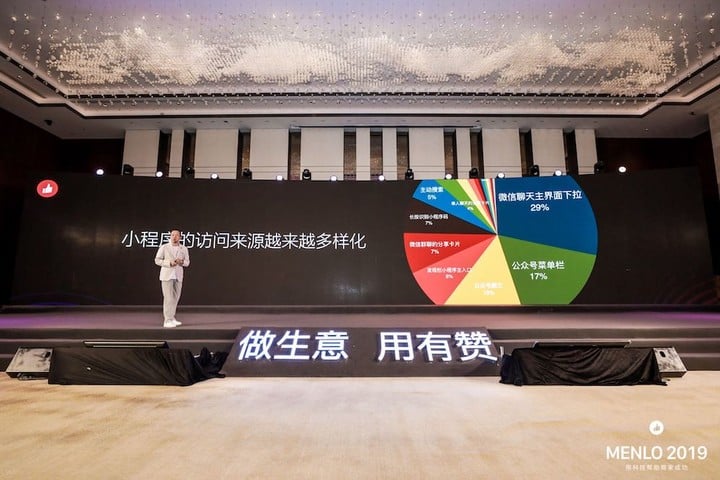
However, in the recent external presentation, there are praise CEOs, Crows, who will frequently compare with the SaaS service company Shopify in Canada, the latter, the Amazon, ebay and other e-commerce giants grow together, let the terminal retailer home Get rid of the burden of buying expensive enterprise software at once, merchants can build their own online store using various themes and templates.
Helping merchants build a “new official website” that has the ability to purchase, maintains its own customers, spreads brands, and saves marketing expenses. The white crow believes that after the platform e-commerce stage represented by Taobao, Tmall, and Jingdong, the social e-commerce represented by WeChat provides this possibility, which is the logic of Tengxu’s investment.
However, there are praises that want to make such a role, search engines are a force that cannot be ignored. The White Raven has mentioned a data, and the Shopify CEO has revealed that 50% of Shopify’s orders come from Google, 30% of the trades fall to Shopify, and 30% fall to Amazon’s flagship store. Since 2016, there have been more and more traffic from Baidu.
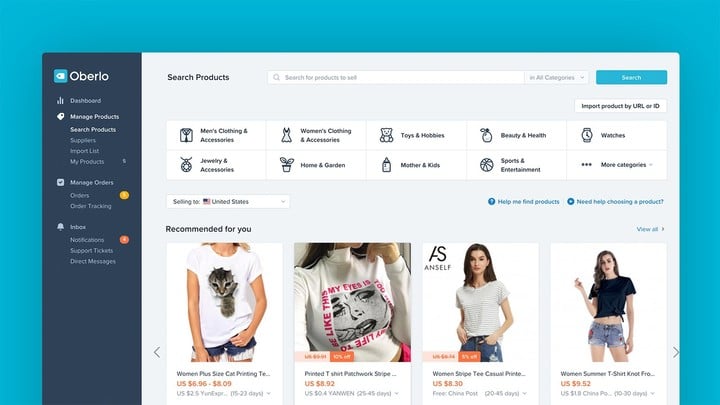
▲An e-commerce plug-in provided by Shopify
From search to purchase, it can also be an integrated, closed-loop experience. Baidu has long been China’s largest search engine, users have the habit of searching in Baidu, and accurate search traffic often has a willingness to purchase, and the conversion is more natural.
For Baidu, the new connection also has greater commercial value. A little finance used Google as a reference. In cooperation with retailers such as Target, Wal-Mart, and open customers, the latter provided a portion of each order to Google in addition to advertising fees.
This is a great reference for Baidu, which has already formed a closed-loop ecology.
All are small programs. What is the difference between Baidu and WeChat and Alipay?
When the small program was launched in early 2017, Zhang Xiaolong had attributed it to the programmer’s feelings: the highest dream of every programmer is to build an “operating system” that can run other programs, but there is actually a lot deep behind this. The reason for the hierarchy.
With the end of the online demographic and traffic dividends, China’s mobile Internet is rapidly maturing. App Eco is tending to be closed, and there is a serious Matthew effect. According to statistics, at the end of 2015, the domestic mobile Internet user’s scale growth dividend disappeared, and the competition into the stock market: 0.1% of super applications accounted for 70% of the total network distribution traffic. % means that it is more difficult for small and medium-sized developers to get the slope of traffic; and the interest of users installing applications is low, 50% of users install 0s per month, and new applications are more difficult to reach users.
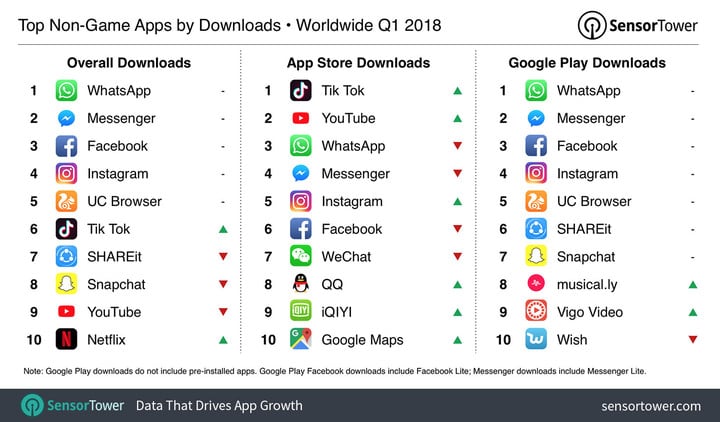
▲App Store rankings have long been occupied by a few head apps
In this context, Internet giants, super apps, and even mobile phone manufacturers are beginning to launch small programs or similar services that do not require downloading, WYSIWYG, which also marks the mobile Internet is moving toward the small program Internet.
Now, WeChat, Alipay and Baidu have become the three most important small program platforms. As a platform for combining search and information flow, Baidu also has different characteristics from other platforms.
WeChat is characterized by the connection of “people and people”, so it has great advantages in small games, local life and member marketing; Alipay as a traditional payment tool, its small program is also expanding life services around payment. Compared with them, Baidu’s smart applet is a centralized distribution ecosystem, which is more suitable for planting grass, inspiring, and cultivating users’ cognition and interest. The relevant person in charge of the Bank of Communications credit card used Baidu smart small program compared with WeChat and Alipay. He is more optimistic about Baidu, because Baidu search can directly bring huge traffic.
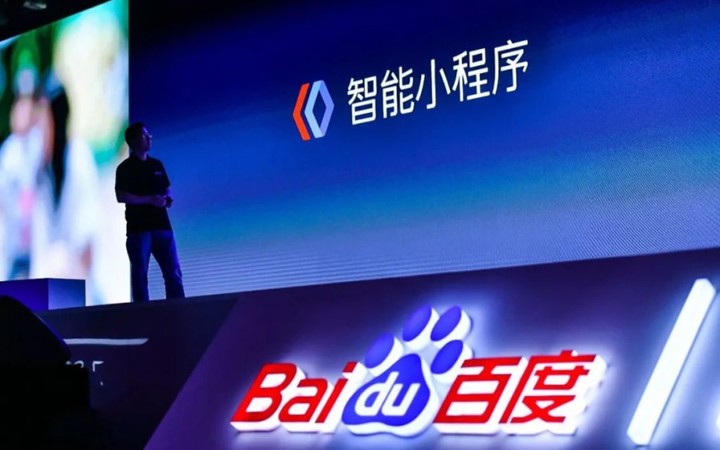
Of course, Baidu also acknowledges that Baidu’s smart gadgets are doing more marketing conversions, providing developers and merchants with more capabilities to enable them to be branded while they are getting customers. There are more possibilities in customer operations and so on, which is the focus of Baidu’s next phase.
Now, the daily active users of Baidu App have exceeded 200 million, the number of Baidu smart applets has exceeded 230,000, and the number of monthly active users has exceeded 270 million, which has initially formed a huge ecology.
If AI is Baidu’s future, search and information flow is Baidu’s current, and smart applets are upgrading search and information flow from connecting “people and information” to connecting “people and services.” For the platform, the small program is pushing the product form to upgrade from the service value, helping the super app to grow into a real “operating system”.